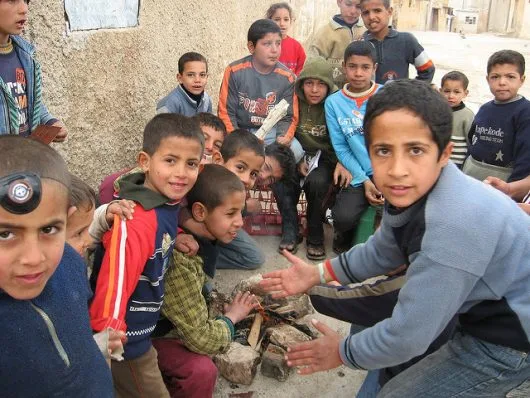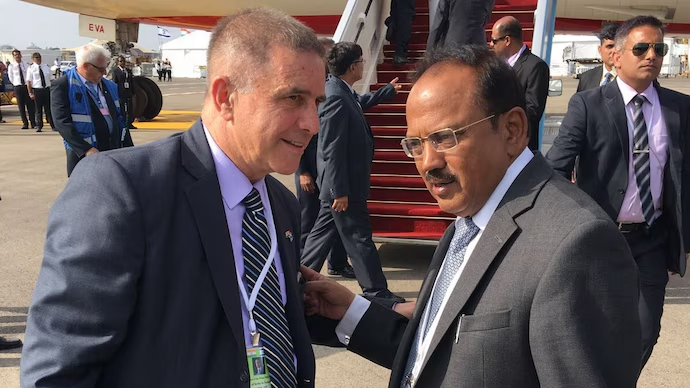Approximately 25,000 children in Gaza are currently facing the devastating reality of becoming orphans, according to initial findings from the region. Euro-Med Human Rights Monitor has reported that Israel’s aggressive bombing campaign in the besieged enclave has resulted in this alarming situation.
The preliminary report by the rights group underscores the profound impact of Israel’s airstrikes, revealing that around 10,000 children have lost their lives as a direct consequence of the bombings. Furthermore, an estimated 25,000 children have been left without one or both of their parents, while a staggering 640,000 have been rendered homeless as their residences were either partially or entirely destroyed.
Compounding the crisis, the education of hundreds of thousands of children hangs in the balance, with 217 schools in the Gaza Strip sustaining damage or complete destruction during the Israeli attacks. This widespread destruction severely disrupts the educational process in the already vulnerable enclave.
Euro-Med Monitor reports that the toll of the intense Israeli air and artillery assaults on the Gaza Strip stands at 23,012 Palestinians killed, including 9,077 children. The gravity of the situation is further emphasized by the fact that numerous additional children remain trapped beneath the rubble of demolished structures, facing slim chances of survival. With this in mind, the total number of child casualties is anticipated to surpass the grim milestone of 10,000. The ongoing humanitarian crisis in Gaza demands urgent attention and international intervention to address the immediate and long-term needs of the affected children and families.
The Imperative Solution: Putting an End to War
Introduction:
In a world fraught with conflicts and geopolitical tensions, the call for peace and the cessation of war resonates more urgently than ever. The consequences of armed conflicts are devastating, leaving behind a trail of destruction, displacement, and human suffering. This article delves into the imperative need for a global commitment to stopping wars and explores the potential pathways towards a more peaceful and stable world.
The Human Cost:
One of the most compelling arguments for ending wars is the staggering human cost. Lives are lost, families are torn apart, and communities are shattered in the wake of armed conflicts. The toll on civilians, especially women and children, is immeasurable, with the scars of war lasting for generations. By choosing peace over conflict, we can protect the most vulnerable and ensure a more secure and humane world.
Economic Impact:
Beyond the human tragedy, wars exact a heavy toll on economies. Scarce resources are diverted from essential social services to fund military endeavors. Infrastructure is destroyed, hindering economic development and long-term stability. Redirecting resources towards peaceful initiatives and diplomacy can foster economic growth, improve living standards, and create a foundation for sustainable prosperity.
Diplomacy and Conflict Resolution:
A paramount solution to ending wars lies in prioritizing diplomacy and conflict resolution. Nations and global organizations must invest in dialogue, negotiation, and peaceful mediation to address underlying issues that fuel conflicts. A commitment to diplomatic solutions can prevent the escalation of tensions, resolve disputes, and build lasting partnerships that contribute to global stability.
International Cooperation:
The interconnectedness of the modern world demands a collaborative effort to address the root causes of conflicts. International cooperation and collaboration among nations, organizations, and civil society are essential in fostering a culture of peace. Shared values, mutual understanding, and joint initiatives can create a global environment where the resolution of disputes is achieved through dialogue rather than military force.
Disarmament:
An integral part of the solution is a commitment to disarmament. Nations must work towards reducing their military capabilities and investing in alternative means of conflict prevention. International agreements and treaties that promote disarmament can create a safer world and diminish the likelihood of wars breaking out.
Public Advocacy:
Lastly, the power of public advocacy and grassroots movements cannot be underestimated. Civil society plays a pivotal role in pressuring governments to prioritize peace over war. Through education, awareness campaigns, and peaceful protests, individuals can contribute to building a collective consciousness that values peace and rejects the destructive nature of armed conflicts.
Conclusion:
The solution to the global issue of war lies in a concerted effort to prioritize peace, diplomacy, and international cooperation. By addressing the root causes of conflicts, promoting disarmament, and fostering a global culture of peace, we can aspire to create a world where the devastating impacts of war are replaced by the resilience of dialogue, understanding, and shared prosperity. The time to act is now; the imperative solution is to stop war.
War Is Not the Solution: Embracing Alternatives for Global Harmony
Introduction:
In a world marked by diversity, conflict, and differing ideologies, the specter of war often looms large. However, it is crucial to question the assumption that war is an effective solution to the complex challenges that nations face. This article delves into the idea that war is not the solution, exploring the human, economic, and social costs associated with armed conflicts and advocating for alternative approaches to global issues.
Human Cost:
War exacts a staggering toll on human lives, leaving in its wake a trail of death, injury, and psychological trauma. Civilians, including women and children, often bear the brunt of the violence, caught in the crossfire of geopolitical disputes. The loss of lives, families torn apart, and the displacement of entire communities create lasting scars that extend far beyond the battlefield.
Moreover, soldiers who are sent to fight are also victims, facing physical and mental health challenges long after the conflict has ceased. The toll on mental health, including conditions like post-traumatic stress disorder (PTSD), underscores the lasting impact of war on individuals who were simply following orders in service to their nations.
Economic Implications:
Beyond the immediate human cost, war wreaks havoc on economies. The financial burden of military operations, the destruction of infrastructure, and the diversion of resources away from essential services like healthcare and education contribute to economic downturns that can persist for generations. The opportunity cost of investing in war rather than in the well-being and development of societies is a significant factor that should lead us to question the effectiveness of armed conflict as a solution.
Furthermore, the global interconnectedness of economies means that conflicts in one region can have widespread economic repercussions. Trade disruptions, refugee crises, and the destabilization of entire regions can result from military interventions, reinforcing the idea that peaceful alternatives are not only humane but also economically prudent.
Social Consequences:
War disrupts the fabric of society, eroding trust and fostering animosity between nations. The scars left by conflicts can linger for generations, perpetuating cycles of violence and revenge. Rebuilding trust and fostering cooperation become monumental tasks in the aftermath of war, hindering the potential for diplomatic resolutions and peaceful coexistence.
Alternatives to War:
Advocating for alternatives to war does not imply a passive acceptance of injustice or the abandonment of the pursuit of justice. Diplomacy, conflict resolution, and international cooperation present viable alternatives to armed conflict. Dialogue, negotiation, and mediation provide avenues for resolving disputes without resorting to violence.
Investing in diplomacy and conflict prevention not only helps avoid the human and economic costs associated with war but also addresses the root causes of conflicts. Addressing issues such as inequality, political instability, and human rights abuses can contribute to long-term stability and global harmony.
Conclusion:
In conclusion, the belief that war is the ultimate solution to complex global challenges warrants scrutiny. The profound human, economic, and social costs associated with armed conflict emphasize the urgency of seeking alternative approaches. By prioritizing diplomacy, dialogue, and conflict resolution, nations can work together to build a more peaceful and just world, leaving behind the devastating legacy of war in favor of a future marked by cooperation and understanding.


